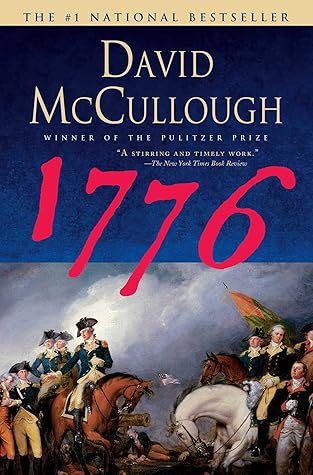More on this book
Community
Kindle Notes & Highlights
It was an army of men accustomed to hard work, hard work being the common lot. They were familiar with adversity and making do in a harsh climate. Resourceful, handy with tools, they could drive a yoke of oxen or “hove up” a stump or tie a proper knot as readily as butcher a hog or mend a pair of shoes. They knew from experience, most of them, the hardships and setbacks of life. Preparing for the worst was second nature. Rare was the man who had never seen someone die.
“We are soldiers who devote ourselves to arms not for the invasion of other countries but for the defense of our own, not for the gratification of our own private interest, but for the public security,” Greene had written in another letter to Samuel Ward.
I found I could not stay in Boston and trust my person with a set of lawless rebels whose actions have disgraced human nature and who have treated all the King’s loyal subjects that have fallen in their hands with great cruelty and for no other crime than for their loyalty to the best of Kings and a peaceable submission to the best constituted government on earth. I don’t believe there ever was a people in any age or part of the world that enjoyed so much liberty as the people of America did under the mild indulgent government (God bless it) of England and never was a people under
The future happiness or misery of a great proportion of the human race is at stake—and if we make a wrong choice, ourselves and our posterity must be wretched. Wrong choice! There can be but one choice consistent with the character of a people possessing the least degree of reason. And that is to separate—to separate from that people who from a total dissolution of virtue among them must be our enemies—an event which I de[v]outly pray may soon take place; and let it be as soon as may be.
General Greene has his finger on the pulse of the nation and nails the situation fully. It is so terribly similar to our current state of Government and society. The Democrats of this country 2024 are so similar to Loyalists of 1776 it pains me to witness
Patriot mobs took to the streets to hunt down Loyalists. Those they seized were beaten, tarred and feathered, burned with candles, or made “to ride the rail,” the cruel punishment whereby a man was forced to straddle a sharp fence rail held on the shoulders of two men, with other men on either side taking a grip on his legs to keep him straight, and thus the victim was paraded through the streets.
“Dear Brother,” a New Yorker named Peter Elting wrote approvingly on June 13, “We had some grand Tory rides in this city this week and in particular yesterday. Several of them were handled very roughly, being carried through the streets on rails, their clothes tore from their back and their bodies pretty well mingled with the dust.”
IN PHILADELPHIA, the same day as the British landing on Staten Island, July 2, 1776, the Continental Congress, in a momentous decision, voted to “dissolve the connection” with Great Britain. The news reached New York four days later, on July 6, and at once spontaneous celebrations broke out. “The whole choir of our officers . . . went to a public house to testify our joy at the happy news of Independence. We spent the afternoon merrily,” recorded Isaac Bangs.
The New Jersey Loyalists were the most villainous of all, Nathanael Greene reported to his wife Caty. They lead the relentless foreigners to the houses of their neighbors and strip poor women and children of everything they have to eat or wear; and after plundering them in this sort, the brutes often ravish the mothers and daughters and compel the fathers and sons to behold their brutality. “The enemy’s ravages in New Jersey exceed all description,” Greene would report to Governor Nicholas Cooke of Rhode Island. “Many hundred women ravished.”
A century later, Sir George Otto Trevelyan would write in a classic study of the American Revolution, “It may be doubted whether so small a number of men ever employed so short a space of time with greater and more lasting effects upon the history of the world.”
He was not a brilliant strategist or tactician, not a gifted orator, not an intellectual. At several crucial moments he had shown marked indecisiveness. He had made serious mistakes in judgment. But experience had been his great teacher from boyhood, and in this his greatest test, he learned steadily from experience. Above all, Washington never forgot what was at stake and he never gave up.


